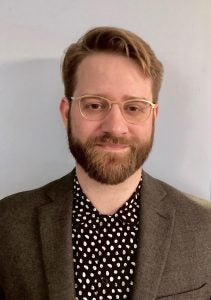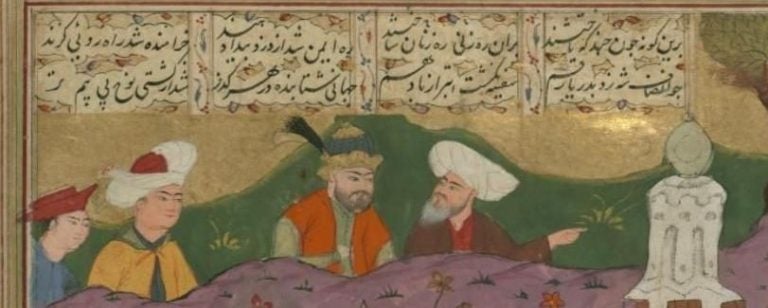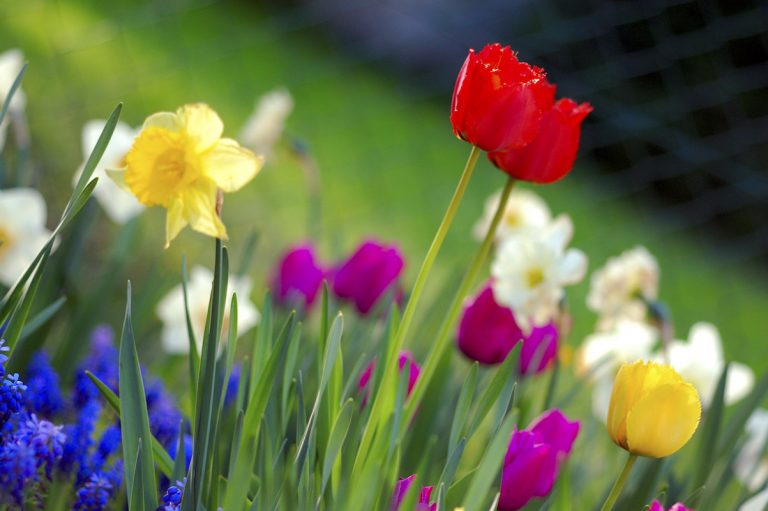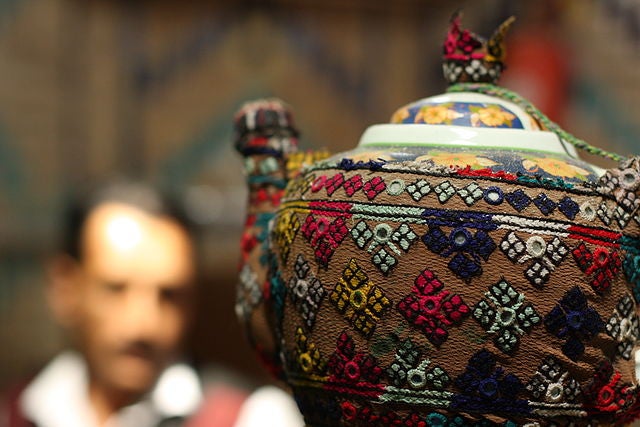The Persianate Studies Workshop is pleased to welcome Dr. Waleed Ziad, who will be workshopping a paper titled “Bibi Sahiba, ‘the Second Fatima’: Female Religious Leadership in 18th – 19th Century Afghanistan” on Monday, February 10, 5:30- 7:30 PM in 1022 South Thayer Building, 202 S. Thayer St., Ann Arbor. Ziad’s paper centers on the female scholar-saint Bibi Sahiba…
Blog
PSW Workshop with Dr. Cameron Cross (University of Michigan) | Monday, December 9, 2019
Please join us for a workshop featuring Dr. Cameron Cross, who will be workshopping a chapter from his book manuscript entitled “In Which Love Has Many a Tale” on Monday, December 9, 5:30-7:30 PM in 4000 South Thayer Building, 202 S.Thayer St. Ann Arbor. Cross’s paper is the prologue of his book project (title still to…
PSA Welcome Dinner
The Persian Student Association is excited to invite you to two events coming up on November 1st! At 6 pm in East Hall Room 1360, one of our incredible members, Parmida Davarmanesh, is holding a lecture called “Iran, Behind the Headlines.” In this talk, she will debunk stereotypes about Iran and share knowledge of Persian…
PSW Workshop with Dr. Prashant Keshavmurthy (McGill University) | Monday, November 4, 2019
The Persianate Studies Workshop is pleased to welcome Dr. Prashant Keshavmurthy, who will be workshopping a paper titled “The Brahman: Xenology in Amīr Khusrow’s Alexandrine Mirror” on Monday, November 4, 5:00- 7:00 PM in 1022 South Thayer Building, 202 S. Thayer St., Ann Arbor. Keshavmurthy’s paper is part of a section of two or three…
 The Persianate Studies Workshop at the University of Michigan will be hosting a writing workshop with Dr. Hunter Bandy on Monday, October 7, 2019. The event will be held in 4000 South Thayer Building from 5:30-7:30 PM. A chapter of Dr. Bandy’s book on the religious worldview of “Ḥakīm al-Mulk” Niẓām al-Dīn Aḥmad Gīlānī, will be workshopped. A copy of the chapter can be requested from Shahla Farghadani (sfarghad@umich.edu) and Brittany Puller (pullerb@umich.edu).
The Persianate Studies Workshop at the University of Michigan will be hosting a writing workshop with Dr. Hunter Bandy on Monday, October 7, 2019. The event will be held in 4000 South Thayer Building from 5:30-7:30 PM. A chapter of Dr. Bandy’s book on the religious worldview of “Ḥakīm al-Mulk” Niẓām al-Dīn Aḥmad Gīlānī, will be workshopped. A copy of the chapter can be requested from Shahla Farghadani (sfarghad@umich.edu) and Brittany Puller (pullerb@umich.edu).
Hunter Casparian Bandy is a Postdoctoral Teaching Scholar in the Department of Philosophy and Religious Studies at North Carolina State University where he teaches classical and modern Islamic history. He received his Ph.D. in Islamic Studies from the Graduate Program in Religion at Duke University in 2019. As a cultural and intellectual historian, his scholarship draws on the manuscript cultures of the Middle East and South Asia, the history and philosophy of science, and critical theory. His dissertation examined the religious worldview of “Ḥakīm al-Mulk” Niẓām al-Dīn Aḥmad Gīlānī (1585-1662?), a Shi’i Muslim philosopher, physician, and occultist whose intellectual career unites the religious landscapes of Kārkiyā’ī Gilan, Safavid Iran, Mughal India, and the Quṭbshāhī Deccan. He also holds an M.A. in Middle Eastern Studies from Harvard University and a B.A. in Political Science from Swarthmore College. His research has been supported by grants and scholarships from Fulbright-Hays, the Dolores Zohrab Liebmann Foundation, the Evan Frankel Foundation, the Foreign Language and Area Studies program, and many other sources.
Re-covering the Qutbshahi Origin Myth
The founding myth of the Quṭbshāhī Sultanate (1518-1687) of Golkonda-Hyderabad attributed its political success to their dynastic founder’s devotion to the Twelve Shiʿi Imams and the blessing of a living Niʿmatullāhī Sufi saint in Iran. For the past half-century, religious and social historians have presumed this myth arrived within a ‘lost’ historical work, which survives only in later retellings. However, literary analysis of new manuscript evidence demonstrates that the original version of this myth survives to this day. Not found in a formal work of history per se, the myth was instead an exemplum, or ethical lesson, contained in a work of political theology dedicated to the third Quṭbshāhī ruler, Ibrahim (r. 1550-1580). Using chancery documents to elucidate the courtly context of its production, this chapter re-situates the original myth and argues that the Imāmī Shiʿi -Niʿmatullāhī Sufi devotion of the author and his broader community of Muslim courtiers captures one dimension of the fluid Muslim culture embracing the wider religious landscape of early-modern South Asia that should not be depicted in hyper-sectarian terms as modern nationalist histories have done. This revisionist reading refutes the widely held opinion about the categorical early-modern Shīʿī Muslim antipathy towards Sufism, which has also been promoted by many historians of Safavid Iran and reflected in the work of major historians of Muslim South Asia. This research also refutes the widely-held presumption that Sufi networks ceased meaningful operation between Safavid Iran and its regional partners by the middle of the 16th century. Throughout their early history, courtiers of the Quṭbshāhī Sultanate who arrived from Iran not only maintained but refined the genealogical claims of their rulers in order to corroborate their identity as the preeminent Shiʿi Muslim power of the Deccan Plateau of southern India, all while forging new ties to the hereditary leadership of the Niʿmatullāhī Sufi order in Iran and its remnants found more locally within the Deccan and even Mughal north India. In summary, these new manuscript findings when read within their proper historical context help to upend longstanding historiographic narratives about enduring religious separatism and exceptionalism by offering a much-needed corrective reading in favor of religious fluidity and pluralism.
Final Persian Roundtable — April 19
Doostan-e aziz, We’re excited to invite you to our last Persian Roundtable of the Winter 2019 term, which will take place at 4pm on Friday, April 19 in STB 4000. Please note we moved the date back a week. So, again: Friday, April 19 4000 South Thayer Building / 202 S Thayer St 4:00–5:00 pm Hope…
Persian and Iranian Studies Backpacking Event – April 5, 2019
The Iranian Studies Program at the University of Michigan is pleased to announce its semiannual Backpacking Event on Friday, April 5, 2019 (we pushed the date back a week so as not to conflict with this weekend’s Nowruz festivities). Come meet students and faculty involved in Persian and Iranian Studies, enjoy a spread of Iranian…
Nowruz events at U-M
Happy Nowruz! There are two upcoming events to usher in 1398 at the University of Michigan: The Persian Students Association (PSA) will put on their annual Nowruz show, entitled Zeeba / زیبا , on Saturday, March 30, 2019 from 7:00–9:00pm in the Power Center for the Performing Arts; visit the event’s posting on Happening @ Michigan…
Persian Roundtable sessions: March and April
Dear all, Welcome back from break! We’re excited to see you soon at the upcoming Persian Roundtable events, where we will gather for tea, baklava, and Persian conversation: March 15 March 29 (Backpacking Event, held in STB 3000) April 12 Meetings will take place in STB 4000 (202 S Thayer St, Ann Arbor) from 4–5 pm, and are…
The Iranian Revolution and its Disciplinary Aftereffects
Don’t forget—This Friday and Saturday we will be hosting a special symposium bringing together experts in the diverse disciplines of Iranian Studies to discuss the state of the field on the 40th anniversary of the 1979 Revolution, followed by a film screening on Sunday. The program is included below, and go here for complete details.…







